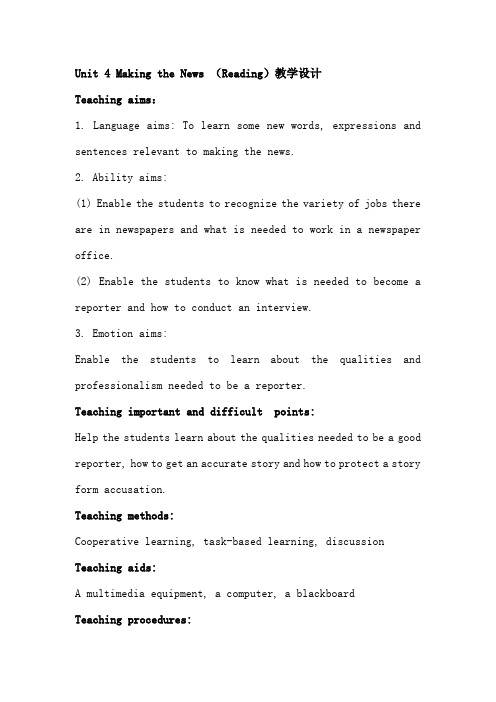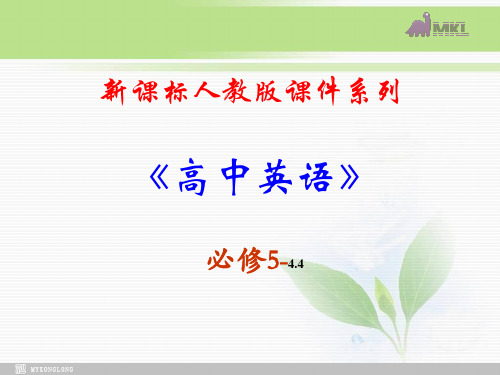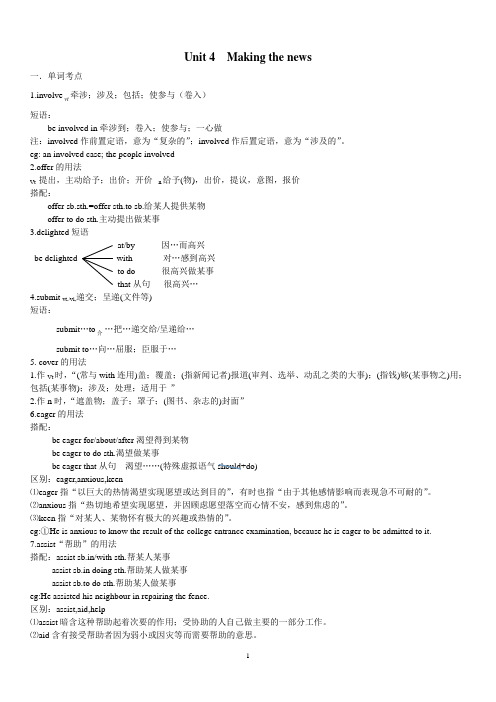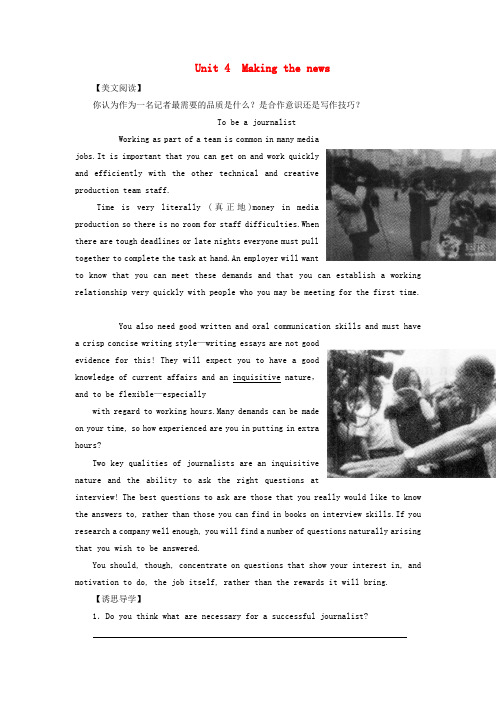2020编版《高中英语》五 4.6《Unit 4 Making the news》
- 格式:ppt
- 大小:673.00 KB
- 文档页数:14

Unit 4 Making the News (Reading)教学设计Teaching aims:1. Language aims: To learn some new words, expressions and sentences relevant to making the news.2. Ability aims:(1) Enable the students to recognize the variety of jobs there are in newspapers and what is needed to work in a newspaper office.(2) Enable the students to know what is needed to become a reporter and how to conduct an interview.3. Emotion aims:Enable the students to learn about the qualities and professionalism needed to be a reporter.Teaching important and difficult points:Help the students learn about the qualities needed to be a good reporter, how to get an accurate story and how to protect a story form accusation.Teaching methods:Cooperative learning, task-based learning, discussion Teaching aids:A multimedia equipment, a computer, a blackboardTeaching procedures:Step 1 Lead-in1. Show a piece of news to the students.2. Show pictures of some people on the screen and ask the students to guess the jobs of them. (journalist, photographer, editor, designer, printer)3. Students turn their textbooks to page 26, read the title of the passage and find out the main characters quickly by scanning the passage.Step 2 SkimmingStudents skim the passage quickly and find out the main idea. (The qualities needed to become a good journalist.)Step 3 ScanningStudents are divided into seven small groups, scan the passage and finish the “True or False” questions.1. Zhou Yang needs a camera to become a good journalist. (F)2. A journalist needs to be curious.(T)3. A journalist shouldn’t be so talkative but should listen carefully.(T)4. A journalist should listen carefully while taking notes.(T)5. Zhou Yang has got a real scoop.(F)Step 4 Detailed reading1. Students read line 1-15 carefully and fill in the blanks.(1)The first time he will be put as an assistant to an experienced journalist.(2) There is no need for him to take a camera with him. He will have a professional photographer with him to take photographs.2. Students read line 16-29 carefully and fill in the blanks.(1) He needs to be curious.(2) A good reporter must have a “nose” for a story.(3) He has to listen for detailed facts.(4) If the interviewee agrees, he can use a recorder to get the facts straight.3. Students read line 30-41 carefully and finish the “True or False” questions.(1) Hu Xin ever had a case where somebody accused his journalists of getting the wrong end of the stick.(2) The footballer was accused because he lost the game. Step 5 SummaryHelp the students to summarize the main idea of each part as well as the whole passage.Part 1(line1-15): Welcome to work in a teamPart 2(line16-29): How to cover a story; dos &don’tsPart 3(line30-41): How to protect a story from accusationsStep 6 Homework1. Read the passage as fluently as you can, and practice reading it with your partner.2. Write a short passage with the title of “What Makes a Good Journalist?” in about 100 words.Reference words, expressions and sentences:1. experienced2. gifted3. curious4. professional5. patient6. creative7. high level of education8. work experience9. good communication skills10.enthusiasm for the job11. prepared to work long hours12. ability to work in a team13. A good journalist need to be…14. In order to get accurate news, a journalist should…15. Only if you… can you…16. One should keep in mind that…when going out to cover astory.学情分析:1、教学班级是一个普通理科班,虽然已进入高二年级,有了一定的语言基础和认知能力,但是大部分学生英语基础一般,有些学生对英语学习具有恐惧感。



Unit 4 Making the news一.单词考点牵涉;涉及;包括;使参与(卷入)1.involvevt短语:be involved in牵涉到;卷入;使参与;一心做注:involved作前置定语,意为“复杂的”;involved作后置定语,意为“涉及的”。
eg: an involved case; the people involved2.offer的用法提出,主动给予;出价;开价n给予(物),出价,提议,意图,报价Vt搭配:offer sb.sth.=offer sth.to sb.给某人提供某物offer to do sth.主动提出做某事3.delighted短语at/by 因…而高兴be delighted with 对…感到高兴to do 很高兴做某事that从句很高兴…4.submit vt./vi,递交;呈递(文件等)短语:…把…递交给/呈递给…submit…to介submit to…向…屈服;臣服于…5. cover的用法1.作Vt时,“(常与with连用)盖;覆盖;(指新闻记者)报道(审判、选举、动乱之类的大事);(指钱)够(某事物之)用;包括(某事物);涉及;处理;适用于”2.作n时,“遮盖物;盖子;罩子;(图书、杂志的)封面”6.eager的用法搭配:be eager for/about/after渴望得到某物be eager to do sth.渴望做某事be eager that从句渴望……(特殊虚拟语气should+do)区别:eager,anxious,keen⑴eager指“以巨大的热情渴望实现愿望或达到目的”,有时也指“由于其他感情影响而表现急不可耐的”。
⑵anxious指“热切地希望实现愿望,并因顾虑愿望落空而心情不安,感到焦虑的”。
⑶keen指“对某人、某物怀有极大的兴趣或热情的”。
eg:①He is anxious to know the result of the college entrance examination, because he is eager to be admitted to it.7.assist“帮助”的用法搭配:assist sb.in/with sth.帮某人某事assist sb.in doing sth.帮助某人做某事assist sb.to do sth.帮助某人做某事eg:He assisted his neighbour in repairing the fence.区别:assist,aid,help⑴assist暗含这种帮助起着次要的作用;受协助的人自己做主要的一部分工作。

Making the news 课时作业(一)I.单词拼写1. She broke that beautiful vase d _________, which made me quite angry.2. He did steal the famous painting, so he is g________.3. She can________( 专心,集中) on her studies for a long time.4. The reporter went out with a(n) p________ photographer.5. Peter is ____________ (US) to start his new occupation.6. Sorry, sir, but you're not s _________ to sit here, it's for women and childrenonly.7. I want to_______(获取) that skill if it is useful.8. Goods of high q________ sell well.9. They'll arrive in ten minutes. M________ we'll have some coffee10. The student finished the four-year c______ in high school.Ⅱ.短语翻译11.弄清楚,查明白__________________________12.填写,填充__________________________13.向某人提供某物__________________________14.调查,研究某物__________________________15.据报道……__________________________16.热爱……__________________________17.打算,有责任做某事__________________________18.对……有好的影响__________________________19.作为一名记者__________________________20.独自,独立地__________________________21.(内行人的)诀窍__________________________22.有—个对……非常敏感的“嗅觉”__________________________23.第一次……__________________________24.不需要某物__________________________25.渴望做某事__________________________26.专心于(做)某事__________________________27.为了,以便于__________________________2B.确保,务必注意……__________________________29.指控某人犯某罪__________________________30.应当,必须__________________________Ⅲ.句型转换31. He didn't realize the importance of English till he began to work.Not_____ he_____ to work,_____ he _____ the importance of English.32. You needn't go there yourself.______ no______ ______ you______ ______ there yourself.33. This is the story.______ is ____ the story______.34. He spoke louder so that he could be heard by people at the back of the hall.He spoke louder______ ______ _________ _____ _____ by people at the back of the hall.35. It is proved that the theory you stick to is wrong.The theory you stick to______ wrong.Ⅳ.单项填空36._______ he met with the difficulty, did he realise the importance of our help.A. Even thoughB. Never untilC. Only beforeD. Ever since37. —I think the company may not offer you a good pay.—______, I won't take the job.A. That is to sayB. What is moreC. In other wordsD. In that case38. The education of_____ young is always______ hot and serious topic in the modern society.A. the;/B. the; aC./;theD. a; the39. With an online course Lynn has over 300 000 students all over China _______ her classes through the Internet.A. attendingB. attendedC. attendD. are attending40. —Was i t in 1969______ the American astronaut succeeded _______ landing on the moon?—Yes, that's right.A. when; onB. that; onC. which; inD. that; in41. —Let me help you, Tom!—Thank you. I can do it. Here's to hold all these things.A. a big enough caseB. an enough big caseC. a case enough bigD. a case big enough42. —What do you think made Mary so upset?— her new car.A. As she lostB. LostC. LosingD. Because of losing43. I wonder if your wife will go to the ball. If she ______, so______ LA. does; willB. will; doesC. does; doD. would, will44. Jack ran for a doctor, ______ we stayed with the patientA. thoughB. whileC. meanwhileD. however45. The thief______ away when the police arrivedA. had ranB. was going toC. was up to goD. was about to go46. We had rung up several offices _______ we found all the seats______.A. before; decidedB. as; were takenC. before; bookedD. when; ordered47. Thank you for your offers, but I can manage it ______. Which of the followingis wrong?A. of my ownB. on my ownC. by myselfD. myself48. Don't be angry with him. He made the mistakeA. in commonB. by accidentC. in a hurryD. on average49. The building project _______ next year is, I think not easy______ in time.A. being carried out; to completeB. carried out; to be completedC. to be carried out; to completeD. to be carried out, to be completed50. Please check the shopping list ______ make sure everything needed______.A. so as to; buyingB. in order to; buyC. so as to; has been boughtD. in order to; will be boughtV.阅读理解AThe human nose has given to the language of the world many interesting expressions. Of course, this is not surprising. Without the nose we could not breathe or smell. It is the part of the face that gives a person special character. CyranoDe Bergerac said that a large nose showed a great man-brave, polite, manly, and bright.A famous woman p oet wished that she had two noses to smell. Blaise Pascal, a French philosopher (哲学家) made an interesting comment about Cleopatra's nose. If it had been shorter, he said, it would have changed the whole face of the world. Historically, man's nose has had an important role in his imagination. Man has referred to thenose in many ways to express his feelings. Expressions about the nose refer to human weakness, anger, pride, jealousy (嫉妒) and revenge (报复). In English there area number of phrases about the nose. For example, "to hold up one's nose" expressesa basic human feeling—pride. People can hold up their noses at people, things and places. On the other hand, a person who follows his nose, lets his instinct guidehim.For the human emotion of rejection, the phrase "to have one's nose put out ofjoint" is very descriptive. The expression applies to persons who have been turned aside because of a competitor. Their pride is hurt and they feel rejected. Thisexpression is not new. It was used by Erasmus in 1542.This is only a sampling of expressions in English dealing with the nose Thereare a number of others. However, it should be as plain as the nose on your face that the nose is more than an organ for breathing and smelling.51. This passage is about______.A. the human nose, an organ for breathing and smellingB. the nose giving various expressionsC. a woman poet's wish to have two nosesD. interesting comments made on Cleopatra's nose52. According to Blaise Pascal, "Cleopatra's nose"A. did change the whole face of the worldB. should be shorterC. represented her powerful characterD. had been cut shorter53. "To hold up one's nose" is an expression of______.A. contemptB. revengeC. angerD. jealousy54. A man who is described as "to have one's nose put out of joint"______.A. is happyB. wants to sell a flowerC. is illD. feels hurt and rejected55. When you say it is "as plain as the nose on your face", you mean______A. it is easy to solveB. it is hard to crackC. it is something quite easy to understandD. there is plain-looking nose on your faceBGiving life and hopeOrphans (孤儿) whose parents died of AIDS in Henan Province have been given new hope. Last week the provincial government answered the children's cries by promising 60 million yuan to improve schools, orphanages (孤儿院)and living conditions. But without the efforts of Dr Gao Yao-jie, these cries may never have been heard."I'm a doctor and it's my duty to cure diseases and save lives," said the 77-year-old grandmother. Gao was named one of the 2003 people of year on February 20 by CCTVafter millions of people took part in an online poll. But in 1996, when she started to promote AIDS awareness, using money from her own pocket, her actions were widely misunderstood."Although some of the children were born with HIV, 90 percent of them were notinfected (被感染)"Gao said. "But people still reject (排斥) them. Many orphans change their names after finding a foster family (领养家庭). "The horror of Henan's AIDS problem became known in 1996. Frequent and unsafeblood-selling by poor farmers in the late 1980s and early 1990s had caused HIV tospread through dirty needles and infected blood use. As a doctor, Gao believed she should help: over the last eight years she has visited over 1 000 AIDS and HIV patients and published thousands of pamphlets on AIDS awareness. With her help, hundreds of orphans have returned to school or found foster families."It's a disaster for the whole nation, not only for those innocent (无辜的 ) patients and their families," she explained. Gao is delighted that so many childless families offer to foster orphans. But there is still much that can be done to support these children " I hope that warm-hearted high school students will also reach outand offer a helping hand," she said.56. Gao Yaojie is________.A. an official of the Henan provincial governmentB. a doctorC. an AIDS infected parentD. a high school teacher57. Which of the following is NOT wrong?A. It was the orphans' cries that made the government promise 60 million yuan to improve schools, orphanages (孤儿院) and living conditions.B. Ninety percent of the children born with HIV are infected with AIDS.C. Gao Yaojie raised a great deal of money to help the orphans.D. More and more families are willing to foster the orphans.58. The passage mainly talks about________.A. the dangers of AIDSB. how the government help those orphansC. how Gao Yaojie helped the orphansD. the serious AIDS problem in Henan59. Gao Yaojie was named one of the 2003 people of year because______.A. the government would not answer the children's cries without herB. she used her own money to start to promote AIDSC. she is a doctorD. she visited over 1 000 AIDS and HIV patients60. The government promised 60 million yuan__________A. to reward Gao YaojieB. to help to treat HIV and AIDS patientsC. to help the children whose parents died of AIDSD. to build new hospitals单项填空1. Roses need special care ______ they can live through winter.A. becauseB. so thatC. even ifD. as2. I like______ in the autumn when the weather is clear and bright.A. thisB. thatC. itD. one。

Unit 4 Making the news【美文阅读】你认为作为一名记者最需要的品质是什么?是合作意识还是写作技巧?To be a journalistWorking as part of a team is common in many mediajobs.It is important that you can get on and work quicklyand efficiently with the other technical and creativeproduction team staff.Time is very literally (真正地)money in mediaproduction so there is no room for staff difficulties.Whenthere are tough deadlines or late nights everyone must pulltogether to complete the task at hand.An employer will wantto know that you can meet these demands and that you can establish a working relationship very quickly with people who you may be meeting for the first time.You also need good written and oral communication skills and must have a crisp concise writing style—writing essays are not goodevidence for this! They will expect you to have a goodknowledge of current affairs and an inquisitive nature,and to be flexible—especiallywith regard to working hours.Many demands can be madeon your time, so how experienced are you in putting in extrahours?Two key qualities of journalists are an inquisitivenature and the ability to ask the right questions atinterview! The best questions to ask are those that you really would like to know the answers to, rather than those you can find in books on interview skills.If you research a company well enough, you will find a number of questions naturally arising that you wish to be answered.You should, though, concentrate on questions that show your interest in, and motivation to do, the job itself, rather than the rewards it will bring.【诱思导学】1.Do you think what are necessary for a successful journalist?2.Which one of the following can replac e the underlined word “inquisitive”?A.Creative. B.Positive.C.Curious. D.Strange.【答案】 1.Good written and oral communication skills. 2.CPeriod ⅠPreviewing(教师用书独具)●教学目标初步掌握本课文中的词汇,浅层次理解课文,了解相关的背景知识。
《Unit4Makingthenews》教案高中必修5英语英语教学中,用具体形象的手势、动作来辅助英语学习,激发学生学习兴趣,提高学习效果。
下面是小偏整理的《Unit4Makingthenews》教案高中必修5英语,感谢您的每一次阅读。
《Unit4Makingthenews》教案高中必修5英语教学准备教学目标Objectives:1.InstructionalobjectivesBytheendoftheclass,moststudentsareableto:1)Usethewordsandthephrasestheylearnedtocompletethetas ksbasedonthetext.2)Pronouncecorrectlythenewwords(especially “carnival”)bythemselvesandwiththehelpoftheteacher.3)Morethanhalfofthestudentscanspeakfluentlyandaccurately abouttheirviewstowardscarnivalinpairswiththeteacher’sscaffolding.cationalobjectivesBytheendoftheclass,studentsareableto:Improvetheirculturalawarenessfromcarnivalandlearnmoreab outitsinfluenceonthewesterncultureafterclass3.Personalobjectives:1)Beconfidentofstandingonthestageandspeakclearlyandspo ntaneously.2)Encouragestudentstospeakintheclasswithdifferentkindofte chniques.教学重难点Focalpoints:Bytheendoftheclass,studentsareableto:1)Improvethemainreadingskillsthroughcompletingreadingta sksinpairworkandgroupwork.2)Usethetabletofinishtheiressayabouttheirfavoritefilm.Difficultpoints:Bytheendoftheclass,studentsareableto:1)speakfluentlyandaccuratelyabouttheirfavoritefilmsinpairs withtheteacher’sscaffolding.2)Writeafilmreviewaccordingtothetableandthetext.教学过程ProceduresandtimeallotmentStage1GettingstudentsreadyforlearningT:Classbegins!Ss:…T:Goodafternoon,class!Ss:…T:Today,let’scometoCultureCorner.Module4.DoyouknowChinesefestivals?Ss:…T:First,Workingroups,discussandmakealistofChinesefestivalsi nEnglish.(1min).Ss:…T:OK,timeisup.YouknowChinesefestivals?Ss:…T:verygood.Forexample1.NewYear’sDay元旦节(1月1日)2.SpringFestival春节(农历正月初一)nternFestival元宵节(农历正月15)4.theQingmingFestival清明节(4月5日)5.DragonBoatFestival端午节(农历5月初五6.Double-ninthDay重阳节(农历9月初九)7.NationalDay国庆节(10月1日)T:Andfestivalsbroughtusmuchtraditionalknowledge.So,festiv alisbeautiful.Doyouknowforeignfestivals?Ss:...T:Inthetextbook,therearesomefestivalswithpictures.Doyoukn owtherightdescriptionsaboutthem?Ss:...T:ThisfestivalisattheendofOctober,when“ghosts”comeout.Ss:...T:ThisiswhenAmericansrememberthehardtimeswhentheyfirs tarrivedinthecountry.Ss:..T:Thisisafestivalofcolor,whichmarksthebeginningofspringinIn dia.Ss:...T:ThisisaChristianfestivalwhichcomesinthemiddleofwinterSs:...T:Let’swatchavideo.Canyouguesswhatfestivalitis?.T:Theyaredressedupinspecialclothes,andtheyarewearmasks.Ss:...T:now,Firstquestionishowdopeoplefeelonthisfestival?Second iswhatfestivalisit?Ss:...T:Yes,verygood.Now,let’swatchavideoaboutCarnival.Ss:...T:whatdoyourememberaboutcarnival?Ss:...T:Wherediditfirst?Ss:...Stage2Pre-readingStep1.Listentothetape.T:Let'slistentothefollowingpassagetolearnmoreaboutcarnival .Trytofindoutwhatplacesarementionedintermsofcarnivalcelebrati ons.Ss:..T:...Step2.Scanthepassageandtrytoanswerthequestions.T:Whatisthemeaningofcarnival?Ss:...T:Originallyitmeant“withnomeat”butnowitsymbolizes “life”.Step3.ReadthepassageandmatchcolumnAwithcolumnB.T:OK,nowIwillgiveyou1minutetoreaditagainandthenIwillasky ousomeStage3While-readingStep1Readthepassage.Choosethebestanswerstothetwosente nces.T:areyoufinish?Let’slookatthequestions.firstquestionisT odayCarnivalhasbecomeacelebrationof____. Whichoneyouchoose?A.freedomB.harvestC.lifeitselfD.successSs:...T:YES,verygood.NextquestionisWeneedto_____tounderstand whatcarnivalisallabout.A.lookatthehistoryofAmericaB.gotoAmericaC.lookatthemeetingoftwocultures---EuropeanandAfricanD.BothAandCSs:...T:....Step2checkwhetherthestatementsaretrueorfalse.T:…T:Now,let’scheck.Withtheopeningofhugefarmsandplantations,manyAfrica nswenttolookforjobsinAmerica.,what’syouridea?Ss:…T:Doyouagree?Ss:…T:Excellent,inparagraph2,thismarkedthebeginningoftheslave trade.Sothequestion1isFalse.T:nextquestion2,TheEuropeansimportedtheirfestivalsandlate rtheslaveslearnedfromthemandaddedtheirtraditions.Ss:...T:verygood.Thisanswerinparagraph3.Ss:...T:question3,Theslavetradewasabolishedandthesalvestookoverthecarnival.Ss:...T:thelast,Withthepassingoftime,carnivalbecameafestivalofth eblackpeopleonly.Ss:…T:Exactly!Superb!Step3SkimmingforspecificinformationTask:Answerthequestionsaccordingtothepassage.T:Readthetextcarefullyandanswerthequestions.Next,wewillreadthetextagaintoexplorehowthetextorganized. 3minutes,Let’sgo!T:Now,let’scheckyouranswers.Whatiscarnivaltoday?Ss:Carnivaltodayisaninternational,multiculturalexperience.T:ThesecondquestionisWhereweretheslavestakenfrom?Ss:InAfricaT:....T:Excellent!Stage5Post-readingDiscussion:UsefulquestionstomakeupdialoguesT:therehavesevenquestions,usefulquestionstomakeupdialog ues.Haveyoudressedupinspecialclothes?2Whatdidyouwear?3Howdidyoufeel?4Didyoueatspecialfood?5Didyougiveorreceivegifts?6Didyouhaveaholidayfromschool?7Didyouenjoyyourselfwithyourfamilyorfriends?T:Iwilldividetheclassinto3studentsinagroup.3minutes,1,2,beg in!Ss:...T:Timeisup.whichonedoyouchoose?Ss:....T:Yes,sothethemeofFrankensteinisaboutscienceandhumanity.T:OK,nextgroup,doyouhaveotheranswer?Ss:...课后习题homeworkDoexercisesonPage37-38.人教版高中英语必修5《Unit4Makingthenews》教案【二】Period1&2warmingupandreadingTeachingAims:1.Enablethestudentstotalkaboutthequalitiesneededtobeago odreporterandhowtoconductagoodinterview2.Enablethestudentstolearnsomereadingstrategies3.Enablethestudentstolearnthenecessaryqualitiesintheirfutur ejobImportantPointsanddifficultpointsLearnabouthowtobeagoodreporterTeachingmethodsStrategicreadingmethod;Task-basedmethodTeachingprocedures:I.Elaboration(warmingup):Helpthestudentstorelatetheirknow nknowledgetothetopicthatwillbelearnedTask1:(groupdiscussion)TalkaboutjobsinChinaDaily?TypesofjobsWhatitinvolvesreporterTask2:Predictwhatisgoingtobelearnedbylookingatthetitleoft hetext.Whichtypeofjobwillbetalkedaboutinthetext?II.Prediction(pre-reading):Task3:Predictthemainideaofthetextbydiscussingthefollowing questions:1.Whatarethequalitiesagoodnewsreporterneedstohave?(HavegroupdiscussionfirstandthenfinishPart1individually)2.Whatyourfirstdayatschoolwaslike?Howwouldyoufeelonyou rfirstdayatwork?(Groupdiscussion)III.Skimming,scanning,analyzing(Reading&Comprehending) Task4:Readthetextquicklytogetageneralideaofthetext.Task5:Dividethepassageintothreesectionsandmatchthefollo wingmainideastothethreesections:HowtogetanaccuratestoryHowtoprotectastoryfromaccusationsHowtobecomeareporterTheskillsneededTheimportanceoflisteningStagesinresearchingastoryHowtocheckfactsHowtodealwithaccusationsofprintingliesWorkinateamTask6Readquicklytofindouttheinformationtofillintheformbel owTask7:Tellwhatisrequiredforareporterandaphotographerpatient;imaginative;well-organized;technicallygood;polite;concise;thorough;creative;curio us;careful;gifted;professionalAreporterAphotographerIV.SummarizingTask8:WriteasummaryofthetextV.AssignmentReadanEnglishnewspaperandretellthemainideaofonearticlei nit.Period3&4Words&ExpressionsTeachingAims:Getthestudentstoknowhowtousesomewordsandexpressions correctlyandappropriatelyImportantPointsanddifficultpointsUsesomewordsandexpressionscorrectlyandappropriatelyTeachingmethodsDemonstratingandsummarizing;practicingTeachingprocedures:1.occupationn.1).Teachingismyoccupation.职业2).Swimmingismyoccupation.使…忙碌的事情;消遣occupyv.occupied=busyoccupyoneselfin/withsth.employment;occupation;job;profession;vocation;work;trade Heislookingaroundfor.:artistHeisoutof.Shechoseteachingasher.She’salawyerby.He’sacarpenterby.2.assignv.assignmentn. Shegladlyacceptedtheassignment.(分派的任务;工作) TheEnglishassignmentisabookreport.(课外作业,功课)3.onone’sownofone’sownforone’sownWeshouldcompletethetest_________4.experiencedadj.beexperiencedin/atsth/doingsth. Whoisexperiencedincookinginyourhome?5.Thefirst/lasttime+时间状语从句ThefirsttimeIcamehere,Iwasnotusedtotheclimatehere. Covern.封面,掩盖(物);v.1).Tomwillcoveredtheoutbreakofthedisease.2).Theroadwascoveredwithsnow.3).Shelaughedtocoverherworry.4).Theredarmycoveredabout30milesaday.5).Isthemoneyenoughtocoverthecostofanewshirt?7.Beeagerforsth.(sucess)todosth.thatclauseHeiseagertoseehisdaughter. Weareeagerthattheprojectshouldbestartedearly beanxiousabout=beworriedabout8.Concentrateonsth./doingsth. Weshouldconcentrateonourstudy. Tomisconcentratingonfishing.9.of+抽象名词(importance;value;use;help;benefit) ofspecialinterest=ofnouse=Themeetingisofgreatimportance.=Eachminuteis_____forus.ofgreatlyvaluablegreatvaluableofgreatvalueformuchvalue10.acquire;get;gain1).Isatinthefrontofthebusto____agoodviewofthecountryside.2).Graduallywe_______experienceinhowtodothework.3).They_____thevictoryafterabloodybattle.11.haveanosefor嗅觉灵敏Shehasanearformusic.有鉴赏能力Shehasaneyeforcolorandstyleinclothes.有眼光12.Meanwhile=inthemeanwhile=inthemeantime=atthesametimeMotherwentshopping;meanwhile,Icleanedthehouse13.traden.v.1).JapandoeslotsoftradewiththeUnitedStates.2).Heisashoemakerbytrade.3).Shetrades3applesforsomebananas.14.Trick1).窍门,手法2).playatrick(joke)onsb.=makefunofsb.(玩笑,恶作剧)3).Hegotintothebuildingbyatrick(诡计,花招)15.Challenge1).Hechallengemyviewonthatmatter.2).Tofinishthejobin2dayswasarealchallenge.16.Supportn.1).Ineedyoursupport.v.1)为…提供证据,证实2)Theoldmanenteredtheroomsupportedbyhisgrandson.3).Hehasalwayssupportedtheweakerparty.4).Hehasalargefamilytosupport.17.Case1).Hethoughthehadsolvedtheproblem,butthatwasnotthecase.2).Hereisacaseofbeingcareless.3).Wewilllookintothatcase.incaseofsth.如果,万一…inthat/thiscase在那样/这样情况下innocase决不incase+从句以防;可能;倘若Takeanumbrellaincaseitrains.(incase从句常用一般现在时表将来,或should+do)17.accusesb.ofsth.=chargesb.withsth.Tom____hisbossofhavingbrokenhisword.blamedaccusedchargedscolded18.soastodosth.只能在句末=inordertodosth.=sothat+从句=inorderthat+从句Igotupatfivesoastocatchthetrain=19.admitadmitdoing/havingdoneadmitsb.Into/to(theuniversity)Lilyfinallyadmitted___myumbrellabymistake.totaketohavetakenhavingtakenhavetaken20.n.adj.professionprofessional具有….特点FinishEx3onPage29AssignmentFinishEx1andEx2onPage28andEx3onPage29(Discoveringuse fulwordsandexpressions)FinishEx2,Ex3onPage63andEx4onPage64(Usingwordsandexp ressions)inWorkbook.Period5GrammarTeachingAims:Getthestudentstouse“Inversion”correctlyandappropriately ImportantPointsanddifficultpointsUse“Inversion”correctlyandappropriatelyTeachingmethodsTask-basedmethod;Demonstrating;discussion;summarizing;practicing Teachingprocedures:I.PresentationTask1:ComprehendthefollowingsentencesOnlythendidIbeginmyworkondesigninganewbridge.=Ibeganmyworkondesigninganewbridgeonlythen.2.NotonlywasthereaChristmastree,butalsoexcitingpresentsu nderit.=TherewasnotonlyaChristmastree,butalsoexcitingpresentsu nderit.Inversion:起强调作用II.Analyzing&summarizingTask2:Find4examplesofinversioninthereadingpassage1.NeverwillZhouYangforgethisfirstassignmentattheofficeofC hinaDaily.2.Onlywhenyouhaveseenwhatheorshedoes,canyoucoverasto rybyyourself.3.NotonlyamIinterestedinphotography,butItookacourseatun iversity.4.Onlyifyouaskmanydifferentquestionswillyouacquireallthei nformationyouneedtoknowTask3:Analyzethesentencesaboveandsummarizetherules1.Whycanthesesentencesuseinversion?2.Howaretheseinvertedsentencesmade?※否定副词no;not;hardly,little,seldom,never,nosooner…than,nomore,notonly,only等开头的句子要部分倒装。